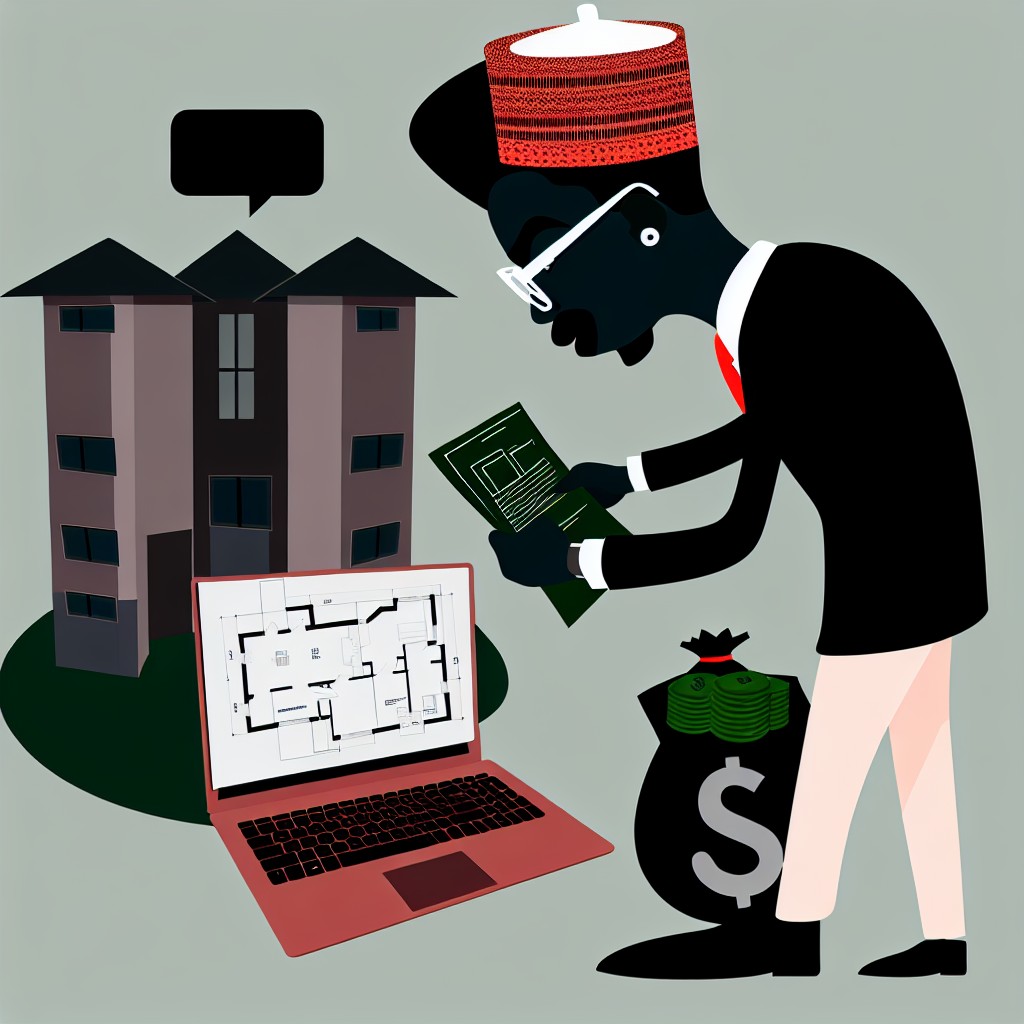Verify the Property’s Legal Ownership and Title Documents
Confirming Authenticity of Ownership
Always request official ownership documents from the seller.
These documents prove the seller’s legal right to sell the property.
Check the property title deed carefully for authenticity.
Moreover, ensure the document is registered with the appropriate land registry.
In Lagos, for instance, verify titles at the Lagos State Land Registry Office.
This step protects you from disputes over ownership later on.
Understanding Key Legal Documents
The title deed shows who legally owns the property.
Also, confirm the Certificate of Occupancy (C of O) if available.
The C of O guarantees government approval of ownership.
In its absence, a Governor’s Consent letter may be presented.
Additionally, request the land survey plan to confirm boundaries.
This helps avoid future encroachment or boundary disputes.
Using Professional Verification Services
Hire a qualified property lawyer to verify all documents.
The lawyer can identify forged or incomplete paperwork.
Additionally, they will check the property for any legal liabilities.
Your Personalized Financial Plan
Get expert financial advice tailored exclusively to your goals. Receive a custom roadmap in just 1-3 business days.
Get StartedReal estate professionals like Surveyors can confirm the physical site details.
Always cross-check the seller’s claims against official records.
This reduces the risk of buying fraudulent properties.
Indicators of Potential Ownership Issues
Beware if the seller hesitates to provide original documents.
Also, watch out for documents with inconsistent or unclear information.
Missing registration stamps or seals is another warning sign.
Similarly, discrepancies in property location or size raise suspicion.
Always question unusual price reductions linked to unclear ownership.
Taking these precautions saves you from costly legal issues.
Check for the Presence of Necessary Government Approvals and Permits
Importance of Verifying Approvals
Buying a house in Nigeria requires confirmed government permits.
These approvals protect you from future legal complications.
Therefore, verify all relevant documents before proceeding.
Additionally, proper approvals guarantee the property is safe and authorized.
Types of Essential Approvals and Permits
Start by checking the Certificate of Occupancy (C of O).
Unlock a Debt-Free Future with Our Unique Strategies
Imagine a life unburdened by debt—a reality we help you visualize and achieve. We offer personalized strategies tailored to your unique situation, guiding you step-by-step toward financial freedom.
Start TodayThis document proves official land ownership by the seller.
Next, confirm the building plan approval from the local government.
This ensures the property complies with zoning and construction laws.
Moreover, verify planning permits from the state’s Ministry of Urban Development.
These permits confirm lawful land use and development permissions.
How to Verify Authenticity of Documents
Request to see original copies of all government-issued certificates.
Then, visit the relevant government agencies to confirm their validity.
Most states in Nigeria have physical offices and online portals for verification.
For instance, Lagos State Urban Renewal Agency offers an online verification service.
Furthermore, hire a reputable lawyer like Emeka Nwosu to assist in document checks.
An expert helps avoid forged or falsified approvals.
Common Indicators of Potential Document Issues
Beware if sellers refuse to provide necessary government permits.
Also, be cautious if documents appear altered or inconsistent.
Additionally, properties lacking a Certificate of Occupancy pose high risks.
Unlock Untapped Nigerian Wealth with Our Expert Advice
Imagine accessing investment opportunities others overlook—stocks, bonds, real estate, small businesses tailored to you. We offer personalized advice you won't find elsewhere, guiding you to financial success.
Unlock WealthSometimes, land may be in disputed areas without clear approval.
In these cases, avoid proceeding until proper permits are in place.
Recommendations for Ensuring Compliance
Work with licensed estate agents such as Heritage Properties to guide you.
Ask for detailed listings of all governmental approvals included in the sale.
Regularly consult local government offices for updated property status.
Lastly, keep copies of all verified permits for future reference and security.
Inspection of the Property’s Physical Condition for Structural Issues
Evaluation of the Foundation and Walls
Start by examining the foundation for visible cracks or uneven settling.
Cracks wider than a quarter inch may indicate serious structural problems.
Next, check the walls for signs of water damage or bulging.
Also, look out for peeling paint or damp patches which suggest moisture issues.
Moreover, uneven walls or misaligned door frames can signal shifting foundations.
Assessment of the Roof and Ceiling
Inspect the roof for missing or damaged shingles and tiles.
Moreover, water stains on the ceiling may indicate leaks.
Check the attic for mould or dampness to identify hidden water problems.
Furthermore, sagging portions of the ceiling require immediate attention.
Inspection of Doors and Windows
Ensure all doors and windows open and close smoothly.
Warped frames can imply structural movement or moisture damage.
Additionally, look for gaps or cracks around frames that may cause drafts.
Glass should be intact without any cracks or condensation between panes.
Identification of Pest Infestation Signs
Termite damage can severely compromise a building’s structural integrity.
Check wooden beams and supports for hollow sounds or tunnels.
Also, watch for droppings, nests, or insect trails around the property.
Consider hiring a professional pest inspector for a thorough evaluation.
Engagement of a Qualified Structural Engineer
After personal inspection, engage a certified engineer for detailed analysis.
They use specialized tools to detect hidden structural faults.
The engineer’s report guides informed decisions about the property’s safety.
Ultimately, this reduces costly surprises after purchase.
Find Out More: How to Prepare Financially for Homeownership in Nigeria
Research the Neighborhood’s Security and Infrastructure Status
Assessing Security Conditions
Start by investigating the neighborhood’s general security situation.
Contact local police stations such as the Ikeja Police Command for crime statistics.
Moreover, speak with current residents about their experiences with safety.
Check online forums or social media groups focused on the area.
Security companies like ShieldGuard Nigeria also provide neighborhood risk reports.
Additionally, observe the state of street lighting and presence of security personnel during visits.
Evaluating Infrastructure Availability
Examine the quality of roads and ease of access to the property.
Confirm the availability of essential utilities like water and electricity supply.
For example, Lagos State Water Corporation updates can indicate water reliability.
Similarly, inquire with local electricity providers such as Eko Electricity Distribution Company.
Also, check the presence of reliable internet and telecommunication services.
Look for proximity to hospitals, schools, and markets, as these support daily life.
Using Local Government Resources
Contact the local government office for development plans affecting the neighborhood.
For instance, the Lagos State Ministry of Physical Planning and Urban Development offers zoning information.
These plans can signal future improvements or potential complications.
Additionally, verify if the area is prone to flooding or other environmental risks.
Important Security and Infrastructure Checks to Consider
- Consult local law enforcement for crime data.
- Engage residents and neighborhood groups for firsthand accounts.
- Inspect street lighting and presence of private security.
- Verify road conditions and transportation accessibility.
- Confirm consistent water, electricity, and internet services.
- Review proximity to essential amenities like schools and hospitals.
- Request local government insight on development and zoning.
- Assess environmental factors like flooding history.
Learn More: How to Negotiate Better Property Deals in Nigeria
Assess the Legitimacy of the Seller or Real Estate Agent
Verify Identification and Credentials
Start by requesting a valid government-issued ID from the seller or agent.
Check for official registration with the Nigerian Institution of Estate Surveyors and Valuers.
Confirm their membership in recognized professional bodies like NIESV or REAN.
Moreover, review their business license to ensure they operate legally.
Research Their Reputation
Look for online reviews or testimonials from previous clients.
Visit local real estate forums to gather feedback about their service quality.
Ask neighbors or community members about their experiences with the agent or seller.
Additionally, verify whether they have a physical office address and contact information.
Request Proof of Property Ownership and Authority
Ask for the Certificate of Occupancy or Deed of Assignment linked to the property.
Ensure the seller’s name matches the name on the official property document.
Confirm that the real estate agent has written authorization to act on behalf of the seller.
Besides, consult the Land Registry to cross-check the legitimacy of property ownership.
Avoid Common Warning Signs
Beware if the seller or agent pressures you to make quick decisions.
Watch out for inconsistent or vague responses about the property’s history.
Be cautious if they refuse to show official documents or identification.
Finally, avoid transactions that demand full payment before signing any agreement.
Explore Further: The Importance of Location in Nigerian Real Estate Investment
Review the Terms and Conditions of the Sales Agreement Carefully
Understanding the Importance of Thorough Review
Always read the sales agreement carefully before signing any documents.
This document outlines the rights and obligations of both buyer and seller.
Therefore, understanding every clause protects you from unfavorable conditions.
Consult a legal expert to clarify complicated terms and jargon.
For instance, Mrs. Olabisi Adeyemi sought advice from a property lawyer in Lagos.
Identifying Key Clauses to Examine
Focus on payment schedules and penalties for delayed payments.
Check the terms regarding property defects and maintenance responsibilities.
Additionally, verify the clauses on dispute resolution methods.
Sometimes, contracts include hidden charges that increase the total cost.
Mr. Emeka Nwachukwu discovered unexpected fees within the fine print of his agreement.
Common Red Flags in Sales Agreements
- Vague property descriptions without exact location or dimensions.
- Unclear or missing ownership history of the seller.
- Restrictions that limit your future property use or modifications.
- Excessive penalties for contract termination that favor the seller.
- Lack of clear timelines for property handover and registration.
Spotting these red flags early helps you avoid legal complications.
Steps to Take When You Find Unacceptable Terms
Negotiate changes to the contract before committing to the purchase.
Engage a reputable real estate lawyer like Mrs. Funke Ajayi for guidance.
Request written amendments and review the updated agreement thoroughly.
Walk away from deals with non-negotiable unfair conditions.
Never rush signing; give yourself time to analyze all terms carefully.
Delve into the Subject: Why Real Estate Is a Smart Long-Term Investment in Nigeria

Investigate Ongoing Disputes or Litigation Related to the Property
Importance of Checking for Disputes
Confirming if a property has ongoing legal disputes protects your investment.
It prevents future financial losses and legal complications.
Moreover, understanding litigation status helps you make informed decisions.
Therefore, always prioritize this step before committing to a purchase.
How to Verify Litigation Status
Start by visiting the local land registry office in the property’s area.
Ask for official records detailing any disputes linked to the property.
Additionally, consult the state or federal judiciary online portals if available.
You can also hire a reputable lawyer experienced in Nigerian property law.
Engage Legal Experts for Thorough Due Diligence
Legal experts like Mrs. Ngozi Eze can conduct comprehensive title searches.
They identify any encumbrances, ownership conflicts, or pending court cases.
Furthermore, lawyers guide you on risk mitigation if disputes exist.
This reduces the chance of unknowingly acquiring problematic properties.
Signs That May Indicate Property Disputes
- The seller hesitates to provide official title documents promptly.
- Multiple owners claim rights to the same property address.
- Neighborhood rumors about boundary disagreements or ownership conflicts.
- Inconsistent or missing land registry records for the property.
Recommended Actions if Disputes Are Found
Do not proceed with the purchase until you fully understand the dispute nature.
Seek professional advice from property lawyers like Mr. Tunde Alabi.
Consider negotiating with the seller for lawful resolution before buying.
Alternatively, explore other properties with clear legal titles to avoid risks.
Be Cautious of Prices That Seem Too Good to Be True
Recognizing Unrealistic Pricing
When buying a house in Nigeria, prices that seem unusually low often indicate problems.
For example, a three-bedroom flat in Lekki offered at half the market price should raise concerns.
Such offers frequently involve hidden issues or fraudulent sellers.
Therefore, always compare the price with similar properties in the area.
Reasons Behind Low Prices
Prices may be low due to legal disputes over the property ownership.
Additionally, the house might lack proper documentation or land title.
Sometimes, the property could be in a flood-prone or unsafe neighborhood.
Moreover, sellers may rush to sell because they face financial difficulties.
Steps to Verify the Price
First, consult reputable estate agents such as Horizon Properties or Azure Estates.
Next, research local property listings on platforms like PropertyPro.ng to gauge average prices.
Furthermore, verify land titles at the appropriate government land registry offices.
Also, seek advice from experienced property lawyers like Adaobi Nwosu or Kemi Ajayi.
Warning Signs Beyond Pricing
If a seller pressures you to make quick payments, be cautious.
Additionally, vague or avoided answers about the property’s history signal risk.
Moreover, refusal to provide official documents is a critical red flag.
Methods to Protect Yourself Against Fraud
Always insist on a formal contract before making any payments.
Furthermore, conduct thorough due diligence with professionals before committing.
Engage local authorities or community leaders to confirm the seller’s credibility.
Finally, trust your instincts if an offer feels too good to be true.
Confirm the Availability of Essential Utilities and Services
Check Water Supply and Quality
Reliable water supply is vital for any home in Nigeria.
Therefore, confirm that the property has continuous access to clean water.
Ask neighbors about the consistency of water delivery in the area.
Additionally, inquire if the property has a borehole or water storage system.
Water quality tests can prevent future health issues.
Verify Electricity Access and Stability
Electricity is a crucial utility that affects daily living.
Check if the house is connected to the national grid managed by Eko Electricity Distribution Company or Ikeja Electric.
Moreover, ask about the frequency of power outages in the neighborhood.
Consider the presence of alternative power sources like solar panels or generators.
Electricity stability can impact property value and comfort.
Assess Waste Management and Sanitation Services
Proper waste disposal ensures a clean and healthy environment.
Find out if Lagos Waste Management Authority (LAWMA) or equivalent bodies operate in the locality.
Confirm the availability of regular refuse collection services.
Also, verify that the property has a functional septic system or connection to the sewage network.
Sanitation services reduce risks of disease and unpleasant odors.
Evaluate Accessibility to Communication Networks
Access to reliable internet and mobile networks is increasingly important.
Check coverage from main providers like MTN Nigeria and Airtel.
Ask about the availability of fixed broadband or mobile data speeds.
Strong communication networks facilitate work, education, and emergencies.
Ensure the home supports installation of necessary communication equipment.
Consider Proximity to Emergency and Community Services
Accessibility to healthcare, fire, and police services enhances safety.
Identify the closest hospital or clinic and its reputation.
Furthermore, confirm the presence of nearby fire stations and police posts.
Community services contribute to better living standards and peace of mind.
Check if public transportation and markets are easily reachable as well.
Consult with a Qualified Legal or Real Estate Professional Before Finalizing
Importance of Professional Guidance
Engaging a qualified legal or real estate expert protects your interests effectively.
Such professionals have extensive knowledge of Nigerian property laws and regulations.
Therefore, they can identify potential red flags that you might miss.
For example, they can verify property ownership and check for disputes.
Moreover, professionals can help you understand complex contract terms clearly.
Choosing the Right Expert
Consult a reputable lawyer specializing in property law in Lagos or Abuja.
Alternatively, consider certified real estate agents with verified credentials.
Amaka Bello, a Lagos-based property lawyer, has extensive experience.
Similarly, Emeka Olatunde, a real estate consultant in Abuja, offers trusted guidance.
Look for professionals with positive client reviews and proper certifications.
Steps to Take During Consultation
First, provide all relevant documents to your legal or real estate advisor.
Then, ask detailed questions about the property’s title and transaction history.
Also, request advice on payment methods and potential fraud risks.
Furthermore, discuss the terms and conditions of the sale agreement carefully.
Finally, confirm the professional’s recommendations before proceeding with payment.
Advantages of a Professional Review
This review minimizes the chances of buying disputed or illegal properties.
It ensures legal compliance and transparent transactions throughout the process.
Besides, it helps you negotiate better terms based on informed advice.
Ultimately, it provides peace of mind for your property investment in Nigeria.
Additional Resources
Just got scammed on a Zillow rental, lost $4500 : r/sandiego
Real Estate Due Diligence Checklist: A Guide for Smart Home Buyers




